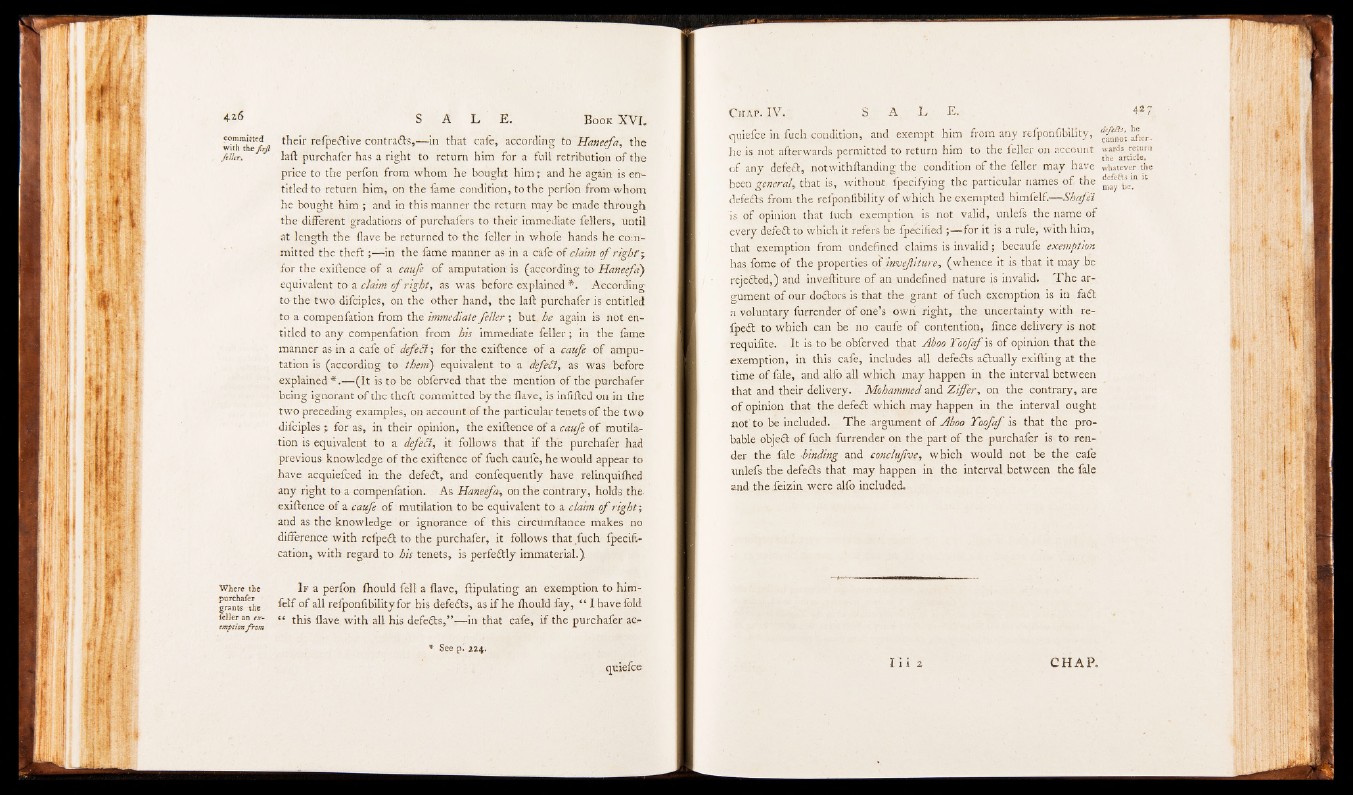
committed
with the firjl
feu*.
Where the
purchafer
grants the
feller an exemption
from
their refpedtive contracts,— in that cafe, according to Haneefa, the
laft purchafer has a right to return him for a full retribution of the
price to the perfon from whom he bought him; and he again is entitled
to return him, on the fame condition, to the perfon from whom
he bought him ; and in this manner the return may be made through
the different gradations of purchafers to their immediate fellers, until
at length the Have be returned to the feller in whofe hands he committed
the theft;— in the fame manner as in a cafe of claim o f righf;
for the exiftence of a caufe of amputation is (according to- Haneefa)
equivalent to a claim o f right, as was before explained *. According
to the two difciples, on the other hand, the laft purchafer is‘ entitled
to a compenfation from the immediate fe lle r ; but, he again is not entitled
to any compenfation from his immediate feller ; in the lame
manner as in a cafe, of defedt; for the exiftence of a caufe of amputation
is (according to them) equivalent to a defect, as was before
explained*.— (It is to be obferved that the mention of the purchafer
being ignorant of the theft committed by the Have, is infilled on in the
two preceding examples, on account of the particular tenets of the two
difciples ; for as, in their opinion, the exiftence of a caufe of mutilation
is equivalent to a defect, it follows that if the purchafer had
previous knowledge of the exiftence of fuch caufe, he would appear to
have acquiefced in the defect, and confequently have relinquilhed
any right to a compenlation. As Haneefa, on the contrary, holds the
exiftence of a caufe of mutilation to be equivalent to a claim o f right-,
and as the knowledge or ignorance of this circumftance makes no
difference with refpect to the purchafer, it follows that .fuch fpecifv
cation, with regard to his tenets, is perfedtly immaterial.).
If a perfon fhould fell a Have, ftipulating an exemption to him-
felf of all refponfibility for his defedts, as if he Ihould fay, “ I have fold
“ this Have with all his defedts,” — in that cafe, if the purchafer a o
* See pi 224.
quiefce
quiefce in fuch condition, and exempt- him from any refpohfibility,
he is not afterwards permitted to return him to the feller on account
of any defedt, notwithftanding the condition of the feller may have
been general, that is, without fpecifying the particular names o f the
defedts from the refponfibility of which he exempted himfelf.— Shafe’i
is of opinion that luch exemption is not valid, unlefs the name of
every defedt to which it refers be fpecified ;— for it is a rule, with him,
that exemption from undefined claims is invalid; becaufe exemption
ha&fome of the properties of invejhture, (whence it is that it may he
rejedted,) and inveftiture of an undefined nature ,is invalid. T h e argument
of our dodtors is that the grant of fuch exemption is in fadt
a voluntary furrender of one’s own right, the uncertainty with re-
fpedt to which can be no caufe of contention, fince delivery is not
requifite. It is to be obferved that Aboo T o o ff is of opinion that the
exemption, in this cafe, includes all defedts adtually exifting at the
time of fale, and alfo all which may happen in the interval between
that and their delivery. Mohammed and Ziffer, on the contrary, are
of opinion that the defedt which may happen in the interval ought
not to be included. The argument of Aboo T o o ff is that the probable
objedt of fuch furrender on the part of the purchafer is to render
the fale binding and conclufve, which would not be the cafe
unlefs the defedts that may happen in the interval between the fale
and the feizin were alfo included.
defetts, be
cannot afterwards
return
the article,
whatever .the
defefts in it
may be.
I l i a C H A P .